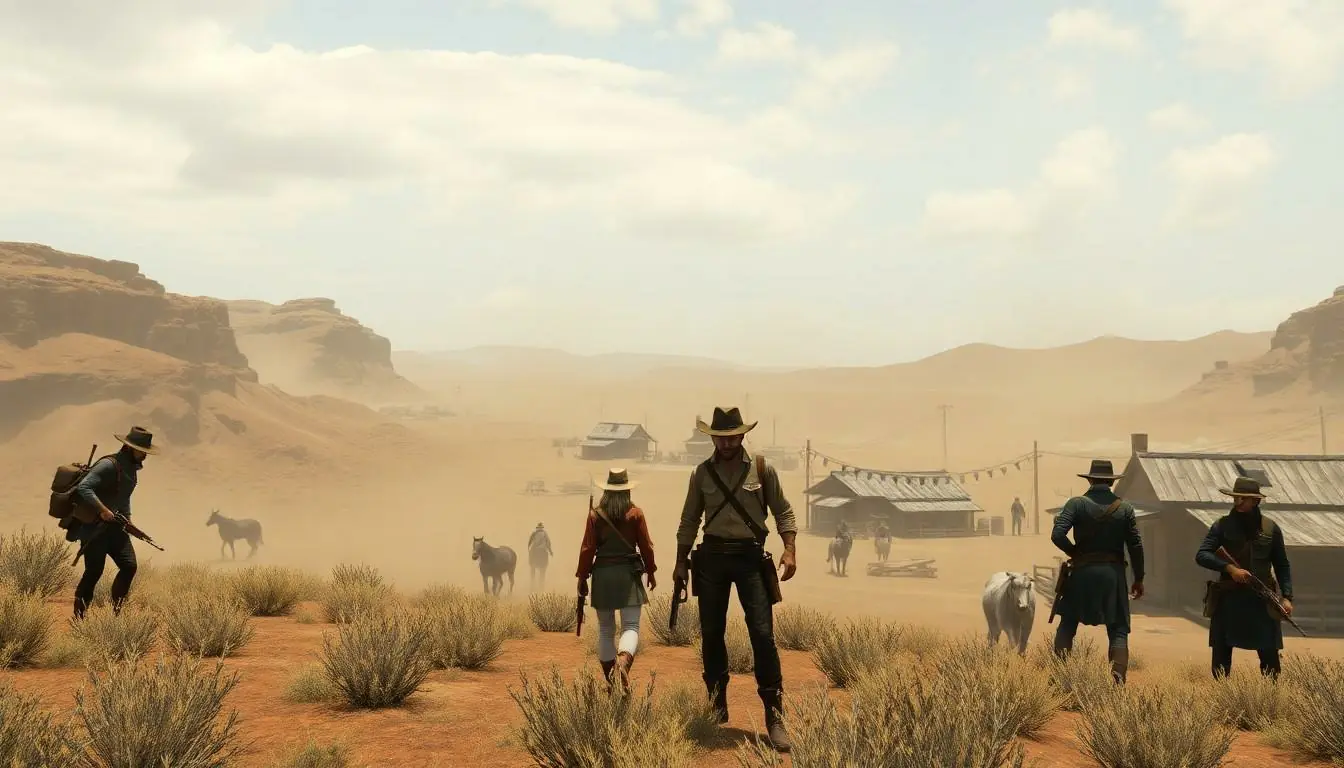Table of Contents
ToggleIn a world where dragons roam and cowboys duel, Western RPGs offer a unique blend of adventure that’s hard to resist. Imagine donning a ten-gallon hat while wielding a sword—sounds like a wild ride, right? These games transport players to vast landscapes filled with epic quests, quirky characters, and enough loot to make any treasure hunter giddy.
Whether it’s galloping through dusty trails or strategizing over a campfire, Western RPGs bring a flavor of storytelling that’s as rich as grandma’s secret chili recipe. With immersive worlds and choices that matter, players dive into narratives where every decision can lead to glory or disaster. So saddle up and get ready to explore the frontier of gaming—where each quest is an opportunity for adventure and a chance to become the hero of your own legendary tale.
Overview of Western RPG
Western RPGs stand out for their unique blend of cowboy culture and fantasy elements. Players experience vast landscapes, epic quests, quirky characters, and valuable loot. Game developers create immersive worlds that capture the essence of adventure, often taking inspiration from the Old West.
Characters within Western RPGs embody a range of roles, from cunning outlaws to noble lawmen. Each player’s choices shape the game’s outcome, allowing for diverse storytelling experiences. The focus often lies on moral dilemmas, where decisions significantly impact narrative arcs and character development.
Many titles in this genre offer an open-world structure. This enables exploration and interaction with the environment in meaningful ways. Players can discover hidden treasures, engage in chaotic shootouts, or forge alliances with NPCs.
Graphics in these games often reflect the rugged beauty of the frontier, enhancing the overall atmosphere. Artistic design combines elements of realism and stylized graphics, making the experiences visually compelling.
Questlines typically intertwine personal goals with broader conflicts, delivering rich storytelling. The narrative depth encourages investment in character relationships, further motivating players to complete missions.
In Western RPGs, crafting and customization play essential roles. Players can gather resources to create items, enhancing their gear and skills. This adds layers of strategy to gameplay, inviting experimentation with different builds.
Overall, Western RPGs provide a thrilling blend of adventure and narrative depth. They invite players to step into immersive, dynamic worlds where every choice matters.
Key Features of Western RPG
Western RPGs distinguish themselves through several defining elements, contributing to immersive gaming experiences. Two notable features include open-world exploration and character customization.
Open World Exploration
Open world exploration offers vast, interconnected landscapes for players to traverse. Players discover hidden treasures, engage in dynamic shootouts, and navigate quests set against stunning backdrops. Environments range from dusty plains to bustling towns, each inviting innovative interactions with NPCs. Terrain varies significantly, creating unique challenges and opportunities. Quests often take players through these expansive settings, encouraging deep engagement. Freedom to choose paths influences gameplay and narrative outcomes, enhancing the overall experience. Players craft their adventures, shaping stories uniquely personal to them.
Character Customization
Character customization allows players to tailor their avatars to reflect personal preferences. They control appearance, abilities, and skills, forging distinct identities within the game. Options may include selecting clothing styles, weapon choices, and skill trees that define gameplay. Players invest time in enhancing attributes, creating specific combat styles or crafting abilities. Customization promotes a sense of ownership over characters, driving engagement further. Each choice impacts interactions and storylines, deepening investment in the narrative. Flexibility in customization emphasizes individuality, ensuring players can navigate worlds that resonate with their unique gamer identities.
Notable Titles in Western RPG
Western RPGs boast several standout titles that capture players’ imaginations. Two series consistently rise to the forefront: The Elder Scrolls and Fallout.
The Elder Scrolls Series
The Elder Scrolls series offers expansive, richly detailed worlds filled with lore. Players immerse themselves in Tamriel’s diverse regions, from the frigid landscapes of Skyrim to the deserts of Elsweyr. Character development shines through branching skill trees and numerous quests, allowing for unique playstyles. Every decision players make influences their journey, encouraging exploration and interaction with diverse NPCs. Iconic titles like Skyrim and Oblivion exemplify how engaging narratives and detailed environments create unforgettable experiences.
Fallout Series
The Fallout series introduces a post-apocalyptic setting where choices shape the wasteland’s future. Players navigate desolate landscapes, encountering mutated creatures and factions vying for control. Each game emphasizes character customization, allowing players to tailor abilities, traits, and appearances. With titles like Fallout 3 and Fallout: New Vegas, the series blends humor with deep moral dilemmas. Engaging questlines entice players to think critically about their decisions, fostering dramatic impacts on the game world.
Evolution of Western RPG
Western RPGs have undergone significant changes since their inception. In the early days, text-based games like “Zork” set the groundwork for interactive storytelling and player choice. Graphics evolved rapidly, leading to isometric perspectives in titles such as “Baldur’s Gate,” which integrated strategic combat with rich narratives.
3D graphics transformed the genre further. The introduction of “The Elder Scrolls III: Morrowind” offered players expansive worlds to explore, enhancing immersion. Questlines became more intricate, allowing for a deeper connection between players and the game’s universe.
Customization options expanded in subsequent titles. “Fallout 3” introduced extensive character creation, enabling players to define skills and appearance. Freedom of choice became a hallmark, influencing gameplay and narrative outcomes significantly.
Development teams began to focus on world-building, creating detailed environments that told stories through exploration. “Red Dead Redemption 2” exemplifies this, combining breathtaking landscapes with compelling characters and plotlines. Players engage in side quests that enhance the main story, adding layers to the gaming experience.
Technology advancements further fueled the evolution of Western RPGs. Innovations in artificial intelligence created more dynamic NPC interactions, encouraging players to strategize differently based on character behavior. The integration of online multiplayer elements, as seen in “Fallout 76,” also marked a shift, introducing cooperative play into the traditionally single-player experience.
This progression reflects a growing understanding of what players desire from their gaming experiences. Depth of narrative, character development, and player autonomy remain at the forefront, ensuring Western RPGs continue to captivate audiences. The genre will likely keep evolving, adapting to new technologies and consumer preferences, maintaining its position as a cornerstone of interactive entertainment.
Impact on Gaming Culture
Western RPGs significantly influence gaming culture, shaping player expectations and design philosophies. Titles such as The Elder Scrolls and Fallout set standards for open-world exploration and complex storytelling. Developers often prioritize player agency through meaningful choices that affect gameplay and narrative.
Character customization enhances player investment. The ability to tailor avatars encourages engagement, leading players to form deeper connections with their characters. This characteristic reflects broader trends in RPG design focused on immersion and relatability.
Themes of morality and consequence resonate with players, prompting them to reflect on decisions within the game world. Impactful storytelling often features ethically challenging scenarios that encourage critical thinking. Players frequently find themselves navigating these dilemmas, further enriching the experience.
Community engagement thrives in Western RPGs. Online forums and social media channels build vibrant communities where players share experiences and strategies, fostering collaboration. These platforms enable exploration of shared narratives, expanding the cultural footprint of the genre.
Notably, the evolution of technology amplifies the genre’s impact. Advancements in graphics and artificial intelligence lead to more dynamic and realistic environments. Enhanced technological capabilities invite deeper gameplay mechanics, further attracting players seeking immersive experiences.
Overall, Western RPGs play a crucial role in shaping not only player experiences but also industry trends. Their blend of storytelling, exploration, and player choice helps establish lasting cultural phenomena in the gaming world.
Conclusion
Western RPGs offer an unparalleled gaming experience that captivates players with their rich narratives and immersive worlds. The blend of cowboy culture and fantasy elements creates a unique environment where choices matter and moral dilemmas abound.
As technology continues to evolve, so too does the depth and complexity of these games, enhancing player engagement through detailed customization and expansive exploration. The impact of iconic series like The Elder Scrolls and Fallout resonates deeply within gaming culture, setting high standards for storytelling and player agency.
Ultimately, Western RPGs invite players to embark on epic adventures and forge their own paths, ensuring their legacy in the gaming landscape remains strong and influential.






